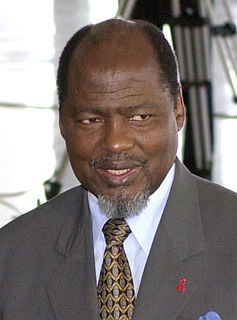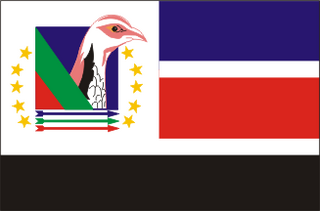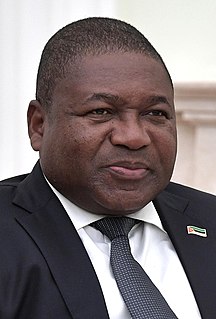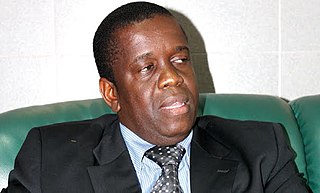Mozambique was a Portuguese colony, overseas province and later a member state of Portugal. It gained independence from Portugal in 1975.

Politics in Mozambique takes place in a framework of a semi-presidential representative democratic republic, whereby the President of Mozambique is head of state and head of government in a multi-party system. Executive power is exercised by the government. Legislative power is vested in both the government and the Assembly of the Republic.

Joaquim Alberto Chissano is a politician who served as the second President of Mozambique, from 1986 to 2005. He is credited with transforming the war-torn country of Mozambique into one of the most successful African democracies. After his presidency, Chissano became an elder statesman, envoy and diplomat for both his home country and the United Nations. Chissano also served as Chairperson of the African Union from 2003 to 2004.

FRELIMO is a democratic socialist political party in Mozambique. It is the dominant party in Mozambique and has won a majority of the seats in the Assembly of the Republic in every election since the country's first multi-party election in 1994.

RENAMO is a Mozambican political party and militant group. The party was founded with the active sponsorship of the Rhodesian Central Intelligence Organisation (CIO) in May 1977 from anti-communist dissidents opposed to Mozambique's ruling FRELIMO party. RENAMO was initially led by André Matsangaissa, a former senior official in FRELIMO's armed wing, and was composed of several anti-communist dissident groups which appeared immediately prior to, and shortly following, Mozambican independence. Matsangaissa, who died in 1979, was succeeded by Afonso Dhlakama, who led the organization until his death in 2018. He was succeeded by Ossufo Momade.
The RENAMO-Electoral Union is an alliance of political parties in Mozambique, led by the Mozambican National Resistance of Afonso Dhlakama.

The United Nations Operations in Mozambique was a UN peace mission to Mozambique established in December 1992 under Security Council Resolution 797 with the assignment to monitor the implementation of the Rome General Peace Accords agreed upon by the Mozambican president Joaquim Chissano (FRELIMO) and Afonso Dhlakama of RENAMO. Its mandate ended in December 1994.

Armando Emílio Guebuza is a Mozambican politician who was the third President of Mozambique from 2005 to 2015.

General elections were held in Mozambique on 1 and 2 December 2004 to elect a president and the Assembly of the Republic. Incumbent president Joaquim Chissano stepped down after 18 years in power, with five candidates running to succeed him. Armando Guebuza of the ruling FRELIMO party won, with over 60% of the vote. FRELIMO also won the Assembly elections, taking 160 of the 250 seats. Turnout for both elections was just over 36%.

Afonso Marceta Macacho Dhlakama was a Mozambican politician and the leader of RENAMO, an anti-communist guerrilla movement that fought the FRELIMO government in the Mozambican Civil War before signing a peace agreement and becoming an opposition political party in the early 1990s. Dhlakama was born in Mangunde, Sofala Province.
The Rome General Peace Accords, officially the General Peace Accords, was a peace treaty signed between the government of Mozambique and RENAMO, ending the Mozambican Civil War on October 4, 1992. Negotiations preceding the agreement began in July 1990. They were brokered by a team of four mediators, two members of the Community of Sant'Egidio, Andrea Riccardi and Matteo Zuppi, as well as Bishop Jaime Gonçalves and Italian government representative Mario Raffaelli. The delegation of the Mozambican government was headed by Armando Guebuza, who went on to become President of Mozambique. The RENAMO delegation consisted of Raul Domingos, José de Castro, Vicente Ululu, Agostinho Murrial, João Almirante, José Augusto and Anselmo Victor. The accords were then signed by the then-president of Mozambique Joaquim Chissano, and by the leader of RENAMO, Afonso Dhlakama.

Filipe Jacinto Nyusi is a Mozambican politician serving as the fourth President of Mozambique since 2015. He is the current leader of FRELIMO, the party that has governed Mozambique since its independence from Portugal in 1975. Additionally, he has served as the Chairman of the Southern African Development Community since August 2020.

General elections to elect the president, Assembly of the Republic, and Provincial Assemblies was held in Mozambique on 28 October 2009. Incumbent President Armando Guebuza ran for re-election as the FRELIMO candidate; he was challenged by opposition leader Afonso Dhlakama, who had stood as the RENAMO candidate in every presidential election since 1994. Also standing were Daviz Simango, the Mayor of Beira, who was a RENAMO member before founding his own party, the Democratic Movement of Mozambique (MDM), earlier in 2009.

The Democratic Movement of Mozambique is a political party in Mozambique. Founded on 6 March 2009, it is led by Daviz Simango, who is the Mayor of Beira. It formed after breaking with RENAMO, the main opposition party.

Daviz Mbepo Simango was a Mozambican politician who was Mayor of Beira from 2003 to the day of his death in February 2021. He was also the President of the Democratic Movement of Mozambique (MDM). He was son of Uria Timoteo Simango the first Vice-President of FRELIMO and Celina Tapua Simango. He joined the main opposition party RENAMO in 1997 and became Mayor of Beira in 2003 as its candidate. On March 6, 2009, he founded a new party, the Movimento Democrático de Moçambique, or MDM.

General elections were held in Mozambique between 3 and 5 December 1999 to elect a president and the Assembly of the Republic. Incumbent president Joaquim Chissano won a narrow victory against Afonso Dhlakama, whilst Chissano's FRELIMO party won the Assembly elections, taking 133 of the 250 seats. Voter turnout for the elections was around 68–70%.

General elections were held in Mozambique on 15 October 2014. Filipe Nyusi, the candidate of the ruling FRELIMO, was elected as President, and FRELIMO retained its parliamentary majority.

The RENAMO insurgency was a guerrilla campaign by militants of the RENAMO party and one of its splinter factions in Mozambique. The insurgency was widely considered to be an aftershock of the Mozambican Civil War; it resulted in renewed tensions between RENAMO and Mozambique's ruling FRELIMO coalition over charges of state corruption and the disputed results of the 2014 general elections.

General elections were held in Mozambique on 15 October 2019. During the leadup to the elections, assassinations and significant intimidation of prominent leaders of opposition parties and election observers were alleged. In addition, State resources, media, and aid for cyclone victims were also alleged to be used in favour of the ruling party (FRELIMO) and its candidates. Local elections observers, civil society organizations, the Commonwealth Observer Group, the European Union Election Observation Mission, and several national and international entities classified the elections as rigged. Nevertheless, the incumbent president Filipe Nyusi of FRELIMO was declared re-elected with 73% of the vote. The main opposition party RENAMO as well as the other oppositions parties involved in the elections contested the results, claiming there were numerous irregularities, and accusing FRELIMO of "massive electoral fraud", including hundreds of thousands of "ghost voters". As evidence for the international community, Ossufo Momade, the president of the main opposition party RENAMO, transported to Europe a box filled with vote ballots that had been marked in favor of the incumbent president Filipe Nyusi of FRELIMO before the commencement of vote. Despite these occurrences, the international community largely ignored any concerns of fraud, and gradually countries started recognizing the incumbent president Filipe Nyusi of FRELIMO as the winner of the elections.
Francisco Xavier Marcelino was a freedom fighter in Mozambique, director of external relations for the anti-communist RENAMO political movement, and later a member of Mozambique's Assembly of the Republic (parliament).













